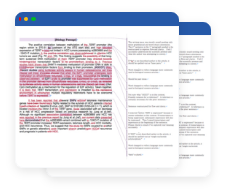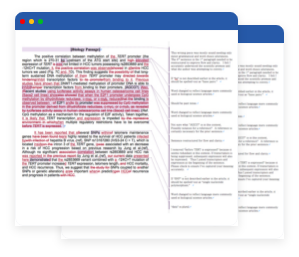Definite and Indefinite Articles (a/an/the)
An article is an adjective (a determiner) that comes before and modifies a noun or noun equivalent.
Articles indicate whether a noun is specific or unspecific. The definite article (“the”) defines a noun as specific, which means that the identity of the noun is known. An indefinite article (“a” or “an”) defines a word as unspecified, which means that the identity of the noun is unknown.
- Example
- The flower smells nice.
- Example
- A flower smells nice.
The first example states that there is one specific flower that smells nice. The second is a general statement: “any flower smells nice” or “all flowers smell nice.”
What are Definite Articles?
The definite article “the” indicates that a noun has a specific identity and/or that it has already been referred to once before in the context of a given piece of writing.
- Example
- The gallery teaching program was designed for the Whitney Museum of American Art.
Here, the “gallery teaching program” is a specific program that was designed for a specific museum (i.e., the Whitney Museum of American Art).
- Example
- These three methods of fabricating the composite were demonstrated to be the most efficient.
The “composite” is one specific composite. It can be presumed from this sentence that this composite was previously identified.
- Example
- Chronic anxiety was found to significantly increase the likelihood of Alzheimer’s in later life.
“Likelihood of Alzheimer’s” is an uncountable noun. However, here it is a specific uncountable noun.
When to use definite articles
| Noun Type | Usage | Example |
|---|---|---|
| Countable noun |
An entire, specific group One specific, countable thing |
The refrigerator was invented in 1834. The earth is not perfectly round. |
| Uncountable noun |
One specific, uncountable thing Noun 1 + of + Noun 2 |
The evidence is indisputable. Sally is the mother of the child. |
What are Indefinite Articles?
Indefinite articles “a” and “an” are used to indicate that a noun has an unspecified identity.
- Example
- The addition of an external heating system, while useful, continuously consumes power and weighs down the vehicle.
Here, “external heating system” is not a specific heating system; any heating system would be useful but would also continuously consume power and weigh down the vehicle.
- Example
- “Fragmentary Blue” is a poem by Robert Frost.
Robert Frost wrote many poems and “Fragmentary Blue” is one of them.
- Example
- An irregularity was identified in the composite.
It can be presumed from the indefinite article “an” that this “irregularity” was not previously established. Any future reference to this particular irregularity should use the definite article “the.”
- Example
- An irregularity was identified in the composite. The irregularity was caused by a leak in the vacuum chamber.
| Noun Type | Usage | Example |
|---|---|---|
| Countable noun |
One member of a countable noun First mention of a countable noun |
I would like a book on scorpions. We found an anomaly. |
| Uncountable noun |
Never used with indefinite article |
N/A |
Choosing “a” or “an”
The choice between “a” and “an” depends on the sound the following word begins with. The article “a” precedes words that begin with a consonant sound; the article “an” precedes words that begin with a vowel sound. For example, the word “apple” should be preceded by “an.” This is because the word “apple” begins with a vowel and a vowel sound.
- Example
- A good notebook should have a sturdy cover and tear-resistant paper.
- Example
- I peeled an orange for my sister.
- Example
- An SSD contains nonvolatile flash memory.
Using indefinite articles with uncountable nouns
Indefinite articles typically cannot be used with uncountable nouns.
- Incorrect
- There is a snow outside.
- Correct
- There is some snow outside.
This is incorrect because “snow” is an uncountable noun. There are, however, certain uncountable nouns that are sometimes treated as countable. This is generally only applicable to casual, non-academic contexts.
- Example
- I will have a water.
- Example
- Can you pass me a sugar?
It can be assumed here that “a coffee” is being used to mean “a cup of coffee.” The same applies to “a sugar”; “a sugar” can be assumed to mean “a cube of sugar.”
Applying an Article Before an Adjective
A noun that is modified by an article is often also modified by another adjective. In such cases, the article typically comes from and then is followed by the adjective and noun.
- Example
- An unusual dent was identified in the composite.
- Example
- We propose an effective method of regulation.
- Example
- The first basic method of modeling was based on a differential equation model.
Articles with Pronouns
Articles cannot be used with pronouns. This is because both articles and pronouns indicate specificity and using both would only cause confusion.
- Incorrect
- Here is the your computer.
- Incorrect
- Can you help me find a my notebook?
However, depending on the context, a definite article and a pronoun may be used interchangeably.
- Example
- Here is the computer.
Here is your computer.
When to Omit an Article
In some cases, an article can be omitted before a noun because the article is implied and does not need to be explicitly written. Articles are usually omitted before (1) languages / nationalities, (2) academic subjects / fields of expertise, and (3) certain abstract ideas.
Referring to languages and nationalities
Articles are always omitted before languages.
- Incorrect
- Phil is learning the Japanese.
- Correct
- Phil is learning Japanese.
Depending on the context, articles are also omitted before nationalities.
- Example
- Lana is the American.
The above sentence implies that there are multiple people but only one American (and her name is Lana).
- Example
- Lana is American.
Lana is an American.
These sentences, on the other hand, simply mean that Lana’s nationality is American.
Referring to academic subjects and other fields of expertise
Academic subjects and other fields of expertise, such as sports, are also not preceded by articles.
- Incorrect
- He studies the physics at university.
- Correct
- He studies physics at university.
- Incorrect
- The gymnastics is a highly demanding sport.
- Correct
- Gymnastics is a highly demanding sport.
Referring to some abstract ideas
Articles are generally unnecessary when writing about abstract ideas because an abstract idea is not a specific thing, and articles are used to indicate specificity.
- Incorrect
- The beauty is in the eye of the beholder.
- Correct
- Beauty is in the eye of the beholder.
- Incorrect
- The love is blind.
- Correct
- Love is blind.










